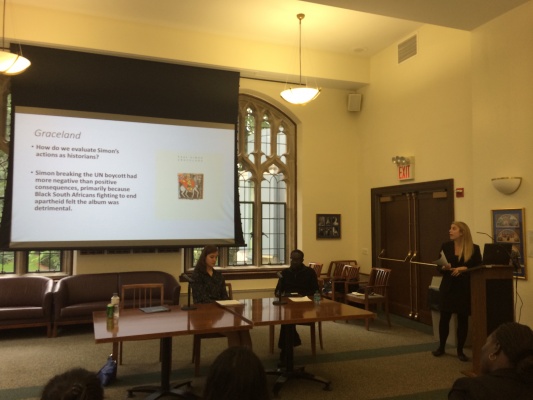AFAM Students Come Together to Share Research
October 24, 2015
On Saturday, Oct. 3, undergraduate students from Fordham at Rose Hill and Lincoln Center convened in Duane Library at Rose Hill to present their research papers on African history from the 2014-15 academic year. Sponsored by the African and African American Studies Department (AFAM), the event was lead by the department’s chair at Lincoln Center, Amir Idris Ph.D., who saw the event through its fifth year this Saturday.
“To encourage our students to discover themselves, and to discover themselves in terms of research and scholarship, we decided to come up with the idea of organizing an annual student led conference,” Idris said. Each year, students are selected based on their final papers, and then asked to refine them over the course of the summer with the guidance of the faculty in order for them to present them come October. “We select the most outstanding papers to share with the faculty, with the broader community at Fordham University, and the public,” Idris said. The eight papers selected followed four keynotes this year, focusing on the Atlantic Slave Trade, Race and Gender, Civil and Human Rights and Apartheid-era South Africa. “Her research” was the theme of the day though with a roster of all female presenters.
Oscillating between powerpoint presentations and readings of the papers, the academic event attracted an audience of approximately 20, many there to jot down notes and support their peers.
Standing by Idris in the facilitation of the event was Robert B. Anderson, S.J., associate professor of AFAM, and Jane Edward Ph.D., clinical assistant professor of AFAM. The professors presented their students to the audience and facilitated discussion among those present. The presentations done ranged from analysis of historic slave trade within the African continent to a multimedia presentation of Paul Simon’s album “Graceland” and the issues it presented upon its release.
One presenter, Madelyn Murphy, Fordham College at Rose Hill (FCRH) ‘17, read out her work analyzing the nature of the American prison system and its relationship to black men over the course of history. “Color has been criminalized,”Murphy said, as she shared her research into the history of race in Mississippi and the complex relationship between racial conflict and masculinity. She emphasized the importance of David Oshinsky’s work in the creation of her paper, citing his book, “Worse than Slavery,” which she relayed with the highest recommendations to the audience.
What Murphy found from her experience, though, wasn’t just academic. The chance to explore her feelings on a topic and then to have the privilege of sharing them has helped drive her toward her senior thesis: “What I realized when I took Mark Chapman’s course, Black Prison Experience, is that mass incarceration is a huge issue and it is something that affects me personally, because I don’t like the idea of locking other humans away.” She emphasized the coming together of activism and academia in her work, which was a theme throughout the afternoon as presenters divulged personal and emotional connections to their work.
As Idris emphasized, the intent of the event was to engage the students in an opportunity to learn, share and prepare for the future, which would make the conference a success. Evgenia Mantikas, FCLC ‘19, said, “It was fantastic. It brought up points that I had never thought about, and it made connections and correlations I had never seen before.”











http://www.guildwars2powerleveling.net/what-monsters-you-will-encounter-in-poe-submerged-passage/ • Apr 10, 2018 at 3:13 pm
This is really a nice place.